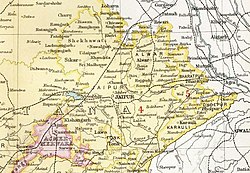Bharatpur State
| Bharatpur State Bharatpore State भरतपुर रियासत |
||||||
| Princely State of British India | ||||||
|
||||||
|
||||||
| Bharatpur State in the Imperial Gazetteer of India | ||||||
| History | ||||||
| • | Established | 17th century | ||||
| • | Independence of India | 15 August 1947 | ||||
| Area | ||||||
| • | 1931 | 5,123 km2(1,978 sq mi) | ||||
| Population | ||||||
| • | 1931 | 486,954 | ||||
| Density | 95.1 /km2 (246.2 /sq mi) | |||||
| Today part of | Rajasthan, India | |||||
Bharatpur State, also known as Bharatpore State, was a Hindu princely state in India. It was ruled by a Hindu Jat dynasty.
The descendants of Khanu Chand became leaders of the Jat caste and rose to considerable power during the Mughal decline in the late seventeenth century. At the end of the 17th century, Jat Baija, Zamindar of the village of Sansani, took advantage of the weakness of the Mughal Empire to enlarge his territory. His descendents, Churaman Singh and Badan Singh, continued the expansion, the latter being the founder of the fortress of Bharatpur in 1724.
Badan Singh extended his territories and received enhanced titles and honours. He was succeeded by Suraj Mal, his nephew, stepson, and adopted son, under whom the power of the Jats reached its zenith. Suraj conquered a vast territory in north central India, including the Imperial cities of Agra and Delhi. Thereafter the Jats proved fickle allies, making and breaking alliances with the Mughals, the Mahrattas, and the British, losing territory to all three, but also gaining Deeg in the process. The British, under Gerard Lake, 1st Viscount Lake (Lord Lake), fruitlessly besieged the fort of Bharatpur twice, in 1804 and again in Siege of Bharatpur (1805) during the during the Second Anglo-Maratha War, eventually settling for a subsidiary alliance after the failure of the second siege. The fort eventually fell to Stapleton Cotton, 1st Viscount Combermere's (Lord Combermere) forces in 1826 in the three weeks Siege of Bharatpur after the British had intervened to unseat a usurper, and was demolished. Thereafter, the Jat Maharajas proved to be good allies to the British, supplying large numbers of recruits for the Presidency armies and participating in Imperial campaigns.
...
Wikipedia



